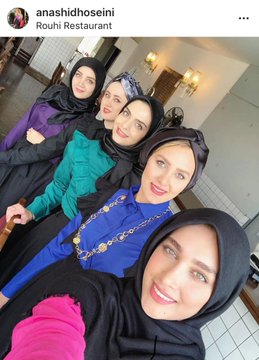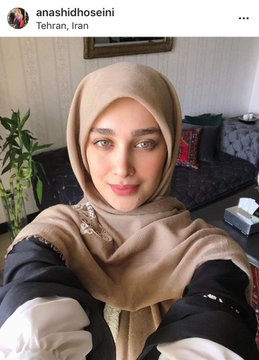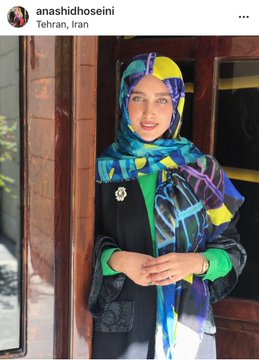RFL/RE – A glimpse into the conspicuous “luxury” of the wedding of an Iranian ambassador’s son has rekindled public criticism of the high times enjoyed by children of Iran’s elite while many of the country’s 82 million people face acute economic pressure.
The atmosphere was already fraught before the recent emergence of the wedding of Amir Mohsen Moradian, the son of Tehran’s ambassador to Denmark, and Anashid Hosseini, an Iranian fashion model and designer — reportedly in the summer of 2017 at a salon advertised as one of the capital’s “most luxurious and beautiful” venues, in the upscale Shahrak Gharb neighborhood.
Iran’s currency, the rial, has long been in decline but has plunged since President Donald Trump’s announcement earlier this year that the United States would abandon a 3-year-old deal and introduce new sanctions. Dozens of cities witnessed street unrest in December and January sparked by hikes in the retail price of many foods, with some protesters calling for the demise of Supreme Leader Ayatollah Ali Khamenei.
And job creation and socioeconomic woes were a major theme during the presidential election in 2017 that delivered a second term to relative moderate President Hassan Rohani.
There have been more recent signs of concern over tougher days ahead, including protests against rising prices in major cities including Tehran, Isfahan, and Karaj.
Then came the images of the Moradian-Hosseini nuptials and critics speculating — perhaps implausibly — that “billions” of rials had been spent. Photos posted online showed government officials in attendance.
The popular Fararu website suggested that the “glamorous” wedding was held at a time when 12 million Iranians of marrying age could not afford to tie the knot.
To some, it has highlighted growing inequality and injustice in Iran. To others, it looks like an example of state officials abandoning strict revolutionary values and ideals.
It has led to renewed criticism of the so-called “aghazadehs,” a term used by Iranians to describe privileged children of the elite who are thought to benefit greatly from connections and family ties, including for access to top jobs and state contracts.
‘End Of Islamic Republic’?
Wedding photos that appeared online led one conservative cleric to suggest that such events could spell the end of Iran’s clerical establishment, whose founder and leaders have long advocated a modest lifestyle while championing the rights of the poor.
“Has the thinking of the Imam” — a reference to the revolutionary leader and founder of Iran’s Islamic republic, Ayatollah Ruhollah Khomeini — “regarding the lifestyle of officials been wrong and superficial?” Seyed Mohammad Mehdi Sadrolsadati asked in reference to the ambassador to Denmark and the groom’s father, Morteza Moradian, in an Instagram post to more than 200,000 followers.
Sadrolsadati, who is based in the holy Shi’ite city of Qom and advocates transparency “without political considerations,” is believed to have been among the first to criticize the wedding as excessive “luxury.”
In his post, which he removed after Moradian complained that the photos had been posted without his permission, Sadrolsadati said that when only a tiny fraction of Iranians can afford to have their wedding in “one of the most luxurious salons in the country” with a “[Mercedes] Benz,” how could a representative of the Iranian establishment allow such an event to take place?
“Don’t you feel responsible? Is it the end of the Islamic republic?” He asked, quoting Khomeini as having said, “It would be the end of the Islamic republic if officials went from living in huts to palaces.”
Bride Should Be ‘Ashamed’
Much of the criticism targeted the bride, Hosseini, who had said in an interview that she only wears foreign brands and that she travels abroad to shop. “We really don’t have anything in Iran, we don’t have brands,” she said.
Many Iranians posted photos from her Instagram page showing her in designer clothing and accessories, including scarves and handbags, but with price tags photoshopped in.
One user suggested that Hosseini personified Iranian “decadence,” particularly since she was a model promoting the Islamic hijab and expensive foreign brands. “Luxury chadori women with a lot of make-up followed by the revolutionary youth,” sociology graduate Saeed Saraf wrote on Twitter.
He added in a reference to a late Iranian mathematician and Fields Medal laureate who shunned the Islamic veil and resided in the United States: “If Khomeini were alive, I would wish that he say whether he felt closer to Maryam Mirzakhani or Anashid Hosseini?”
There was also rare criticism in a state broadcast, with the moderator of a Tehran radio show expressing outrage at the rumored cost of the wedding and Hosseini’s remarks about wearing only foreign brands that most Iranians can’t afford. The moderator cited a recent report about a young boy who had hanged himself in a city in southwestern Iran, by some accounts due to problems related to poverty, asking whether the contradiction did not make the alleged profligates “ashamed.”
“You should go and die. You’ve stepped on the blood of the martyrs,” the host said angrily on air before being cut off.
‘Good Genes’
Ambassador Moradian countered that his son’s wedding was held “according to usual norms and practices” in Iranian society and accused Sadrolsadati of spreading false accusations against his family.
Moradian and Hosseini also dismissed claims of any astronomical costs associated with their wedding, saying they personally covered all the costs.
Hosseini also said many of the designer bags she’s shown wearing on her Instagram page are fake. She said her father was not a government official and that she didn’t have to explain her life before her marriage to Moradian.
“This is all heated and empty talk about the aghazadeh. But I don’t think we’re aghazadeh. Aghazadeh is not someone who has a car that is barely worth 30 or 40 million tomans [$7,000-$9,000] and a 90-square-meter, rented apartment,” she said in a live Instagram broadcast.
The controversy comes a few months after the son of a reformist Iranian politician created a firestorm for crediting his success in life to “good genes.”
It also comes amid suggestions that the sons of several politicians have been promoted to top jobs despite their lack of experience.
Sociologist Ahmad Naghibzadeh said such reports about Iran’s elite could indeed translate into public distrust. “The Islamic republic loses its greatest support base — meaning the people. People develop a highly negative view of the elite,” Naghibzadeh said in a recent interview with Etemadonline.ir.
“I’m surprised by those who are still [debating] the differences between the reformists and the hard-liners,” journalist Mahsa Amrabadi said on Twitter, going on to suggest that the differences were overstated. “The reformist aghazadeh get more attention because of their use of tools like Instagram and their need to show off. The hard-line aghahzadeh are [more discreet] even though they [are good at it, too],” said Amrabadi, who was jailed in Iran amid a crackdown after a disputed election in 2009.
Social media have increased public scrutiny — or at least open discussion — of the lives of the children of the elite, some of whom are living and studying in the West, including in the United States.
Most of them keep a low profile. But there are expectations.
Mohammad Sasha Sobhani, the son of a former Iranian ambassador to Venezuela, is among the few displaying his high life publicly. In an April interview with Iranwire.com, Sobhani, who’s based in Dubai, claimed that he had been financially independent since he was 15.
“I found good friends [in Venezuela]. The son of [late Venezuelan President Hugo] Chavez is my close friend. It’s all been due to my own cleverness; it has nothing to do with the fact that my father was an ambassador,” he said. “My business is my own, but some uncultured Iranians claim that ‘this person has stolen money.'”
 Shabtabnews In this dark night, I have lost my way – Arise from a corner, oh you the star of guidance.
Shabtabnews In this dark night, I have lost my way – Arise from a corner, oh you the star of guidance.




 سعید صراف
سعید صراف


